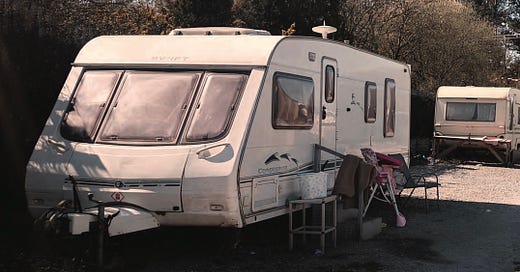Traveller children 12 times more likely to be homeless
The launch of a Traveller housing manifesto in Cork yesterday revealed stark facts about how decades of under investment by local authorities have led to a "hidden crisis" of Traveller homelessness.
Children from the Traveller community are 12 times more likely to be in emergency accommodation than their settled peers, according to a new Traveller housing manifesto launched in Cork on Monday.
Travellers make up 1% of the Irish population, but 12% of children in emergency accommodation are from a Traveller background, the manifesto notes, while calling for local councillors to set up a new task force to tackle the “hidden crisis” of housing for Travellers.
The manifesto, by umbrella group Cork Kerry RTAWG (Regional Traveller Accommodation Working Group), slams the persistent pattern of local authorities underspending on Traveller accommodation, despite funding being made available by central government each year.
Since the year 2000, Irish local authorities have handed back €69 million in funding for Traveller-specific accommodation.
In 2020, Cork County Council was one of nine Irish local authorities to spend zero of their allocated budget for Traveller housing, while Cork City Council was the local authority to spend the most, at €1.4 million.
However in Cork city, no new Traveller housing has been built since “the 1990s,” the manifesto notes, with budgets being spent on replacing or repairing existing housing.
Spring Lane halting site in the Northside of Cork city is set for redevelopment, however: councillors voted to rezone the site to permit for new Traveller-specific accommodation at a council meeting last year, following on from a damning report into conditions at Spring Lane by the Children’s Ombudsman in 2021.
‘Traveller Homelessness: A Hidden Crisis’ was launched online on Monday, January 30, with speakers including Brigid Carmody from the Cork Traveller Women's Network, North Cork Traveller Community Health Worker Margarita O’Driscoll, and Fr Peter McVerry.
Attendees heard that:
22% of Travellers in the South West are homeless, according to a report from UCC, but that a much higher number are in hidden homelessness
39% of the Traveller community are living in overcrowded conditions
Local authorities evict Travellers from roadside sites and present no alternative solutions as to their housing
Local councillors and local authorities are involved in “deliberate inaction” on Traveller housing, sometimes due to the lack of popular support for Traveller housing developments from settled constituents
The Choice Based Letting system for social housing disadvantages those without access to internet or with literacy problems
There have been instances of Traveller families being removed from the local authority housing list with no information as to why
Travellers face frequent discrimination in the private rental market, with 82% of landlords saying they would not rent to a Traveller, according to a survey by the Rental Tenancies Board (RTB)
The manifesto calls for five key actions to be taken to tackle Traveller homelessness.
“There are multitudes of reports on Travellers and Traveller Accommodation: no further research is required,” the manifesto states. “What is needed is action and implementation of the recommendations in those key reports.”
The RTAWG are calling for actions to:
include hidden homelessness in definitions of homelessness
add a right to housing to the constitution
establish a national Traveller Accommodation Agency
create a national action plan on Traveller homelessness that includes Traveller representation on committees
repeal the 2002 Criminal Trespass Act, which is used by local authorities to evict Travellers





